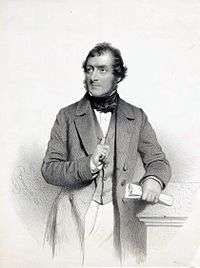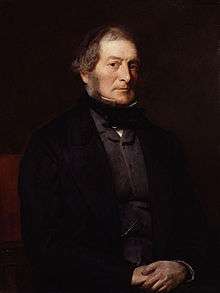Henry Labouchere, 1st Baron Taunton
Henry Labouchere, 1st Baron Taunton, PC (/læbuːˈʃɛər/; 15 August 1798 – 13 July 1869) was a prominent British Whig and Liberal Party politician of the mid-19th century.
- For the writer and publisher (his nephew), see Henry Labouchère
The Lord Taunton PC | |
|---|---|
 Lord Taunton (1855) by Charles Baugniet. | |
| President of the Board of Trade | |
| In office 29 August 1838 – 30 August 1841 | |
| Monarch | Victoria |
| Prime Minister | The Viscount Melbourne |
| Preceded by | Charles Poulett Thomson |
| Succeeded by | The Earl of Ripon |
| In office 22 July 1847 – 21 February 1852 | |
| Monarch | Victoria |
| Prime Minister | Lord John Russell |
| Preceded by | The Earl of Clarendon |
| Succeeded by | J. W. Henley |
| Secretary of State for the Colonies | |
| In office 21 November 1855 – 21 February 1858 | |
| Monarch | Victoria |
| Prime Minister | The Viscount Palmerston |
| Preceded by | Sir William Molesworth, Bt |
| Succeeded by | Lord Stanley |
| Chief Secretary for Ireland | |
| In office 1846 – 22 July 1847 | |
| Monarch | Victoria |
| Prime Minister | Lord John Russell |
| Preceded by | The Earl of Lincoln |
| Succeeded by | Sir William Somerville |
| Personal details | |
| Born | 15 August 1798 Over Stowey, Somerset |
| Died | 13 July 1869 (aged 70) Over Stowey, Somerset |
| Nationality | British |
| Political party | Whig Liberal Party |
| Spouse(s) | (1) Frances Baring (1813–1850) (2) Lady Mary Howard (d. 1892) |
| Alma mater | University of Oxford |
Background and education
Labouchere was born in Over Stowey, Somerset, into a Huguenot merchant family.[1] His father was Peter Caesar Labouchere and his mother Dorothy Elizabeth, daughter of Sir Francis Baring. He was educated at Winchester College and Christ Church, Oxford, where he took his B.A. (1821) and his M.A. (1828).[1]
Political career
In 1826, Labouchere became MP for St Michael, as a Whig.[1] In 1830, he moved to the Taunton seat, which he held until 1859. In 1835 he was opposed by Benjamin Disraeli for the Taunton seat; Labouchere won by 452 votes to 282. He was first appointed to office by Lord Grey in 1832, serving as Civil Lord of the Admiralty .[1] After beginning the second Melbourne ministry as Master of the Mint, Privy Counsellor, and Vice-President of the Board of Trade (and, later, Under-Secretary of State for War and the Colonies), Labouchere was raised to a cabinet post, President of the Board of Trade, which he held from 1839 until the Melbourne government fell in 1841.[1]

When the Whigs, now led by Lord John Russell, returned to office in 1846, Labouchere returned to the cabinet, this time as Chief Secretary for Ireland. Under his administration the worst effects of the Great Irish Famine began to be felt in Ireland. The following year, he once again became President of the Board of Trade, and stayed in that post until Russell's government fell in 1852.[1] From 1853 to 1854 he sat on the Royal Commission on the City of London.[2] Labouchere's final cabinet posting came during the first Palmerston ministry, for which he served as Secretary of State for the Colonies from 1855 to 1858.[1] In 1859, Labouchere was raised to the peerage as Baron Taunton, of Taunton in the County of Somerset.[3][4]
Family
In 1840 Labouchere married his first cousin Frances, daughter of Sir Thomas Baring. They had three daughters:
- Emily (1844–1933) who married Henry Eliot, 5th Earl of St Germans
- Mina Francis, who married Sir Arthur Ellis
- Mary Dorothy who married Edward James Stanley MP
Frances snr died in 1850, aged 36.
In 1852 Labouchere married Lady Mary Howard (1823–1892) daughter of the Earl of Carlisle. There were no children from this marriage.[1] Lady Mary was buried at St Mary's Church, Charlynch, Somerset where a reredos was erected in 1893 in her memory. [5]
Taunton died in July 1869, aged 70, at his London house in Belgrave Square.[1] He was buried near his country house Quantock Lodge at Over Stowey. As he had no sons the barony became extinct on his death.[1] His nephew, also Henry Labouchere, inherited part of Labouchere's fortune, and was later to become a well-known newspaper editor and politician.[1]
Arms
|
References
- Barke, G. F. R. "Labouchere, Henry, Baron Taunton (1798–1869)", rev. H. C. G. Matthew, Oxford Dictionary of National Biography, Oxford University Press, 2004; online edition, Oct 2008, accessed 9 March 2012
- "List of commissions and officials: 1850-1859 (nos. 53-94)". Office-Holders in Modern Britain: Volume 9. 1984. Retrieved 10 March 2008.
- "No. 22298". The London Gazette. 16 August 1859. p. 3108.
- Chisholm, Hugh, ed. (1911). . Encyclopædia Britannica. 26 (11th ed.). Cambridge University Press. p. 453.
- "Charlinch: Church Pages 95-97 A History of the County of Somerset: Volume 6, andersfield, Cannington, and North Petherton Hundreds (Bridgwater and Neighbouring Parishes). Originally published by Victoria County History, London, 1992". British History Online. Retrieved 23 July 2020.
- Burke's Peerage. 1868.
External links
- Hansard 1803–2005: contributions in Parliament by Henry Labouchere
- . New International Encyclopedia. 1905.